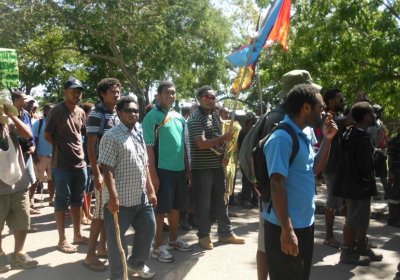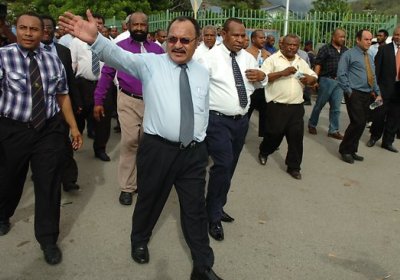WikiLeaks editor-in-chief Julian Assange went to the Ecuadorian embassy in London on June 19 to apply for asylum, after losing his final appeal in British courts against extradition to Sweden.
The extradition to Sweden is nominally over allegations of sexual assault, for which Swedish authorities wish to question Assange ― who has not been charged. But WikiLeaks supporters point to evidence released by the whistleblowing site this year that the United States government has prepared a secret sealed indictment against him.
Ash Pemberton
West Papua has been rocked by a wave of shootings and repression in recent weeks that has left many parts of the occupied nation in a state of fear.
Indonesian security forces went on a rampage in the highlands town of Wamena, killing one person, injuring many others and destroying property on June 6.
Human rights group Tapol said on June 8 the soldiers were seeking revenge for an attack by locals on two colleagues who had run over a three-year-old child with a motorbike. Locals killed one of the soldiers on the motorbike and the other was severely beaten.
The political crisis in Papua New Guinea (PNG) has reached farcical new depths before elections later this month.
Peter O'Neill was elected prime minister by parliament on May 30 for a third time since August. It was a bid to undermine a Supreme Court ruling on May 21 that again reinstated Sir Michael Somare as prime minister.
However, the vote may be illegal, since parliament had already been dissolved before the upcoming election, Reuters said that day.
More than 100,000 people rallied in Santiago on May 16 in protest against Chile's wealth-based education system.
The protest ― which included students, parents, teachers and unionists ― was part of an ongoing campaign that began in May last year. The movement has challenged Chile's education system, under which the quality of a person's education is determined by their ability to pay high fees.
Independent journalist and author Antony Loewenstein visited Papua New Guinea in January and February as part of his research for an upcoming book and documentary about disaster capitalism and privatisation.
He spoke to Green Left Weekly's Ash Pemberton about the influence of the resource industry in PNG, its links with government and private security forces, the rising influence of China and PNG's domestic politics in light of upcoming elections.
* * *
The controversial Ramu nickel mine near Madang in Papua New Guinea has come under fire for new claims of environmental damage.
The mine has been the subject of a long-running battle with locals over plans to pump 100 million tonnes of mine waste into Basamuk Bay over 20 years. The dumping threatens the pristine ecosystem of the area as well as the livelihoods of local people.
The presence of police and mobile brigade soldiers at construction sites for the PNG LNG (liquefied natural gas) project in Papua New Guinea ― majority owned by Exxon Mobil ― is an indication of the community discontent surrounding the project.
Fears have been raised that conflict over the project could provoke violence like that of Bougainville in the 1990s.
The Occupy movement in the United States relaunched itself on May 1 when thousands of people rallied in more than 130 cities across the country to mark May Day — the international day to mark working people's struggles.
The May Day events were billed as a test of strength for the movement that exploded onto the streets in September last year. Occupy Wall Street (OWS) arose to protest against inequality and undemocratic rule by the super-rich — the “1%”.
The Bahrain government's attempts to use the April 22 Formula One race to portray the country as harmonious have backfired badly.
The world's media were forced to focus on the ongoing protests against the ruling al-Khalifa dynasty over demands for democracy and justice for those who have suffered human rights abuses.
The government marketed the race with the slogan "UniF1ed", in a brazen attempt to whitewash the protests and suggest the country had returned to normal.
The crisis embroiling the government of Papua New Guinea has taken new turns as sections of the establishment struggle for power. Public outrage has grown against new laws that undermine the country's constitution.
Just days after pledging it would not use the new powers of the Judicial Conduct Act to suspend judges, the government of Prime Minister Peter O'Neill suspended Chief Justice Sir Salamo Injia and Justice Nicholas Kirriwom on April 4.
The Papua New Guinean government has backed down in the face of a society-wide revolt over its new power to suspend judges. Prime Minister Peter O'Neill said the law would not be implemented until public consultations were carried out.
Thousands of students from the University of PNG rallied in Port Moresby on March 23. Students said in a statement that the law undermines the constitution by removing the separation between the government and courts.
Preliminary court-martial proceedings against United States soldier Bradley Manning have shown the US government's strong desire to make an example of him.
Manning is the military analyst accused of leaking hundreds of thousands of secret US diplomatic cables and US military reports from the Iraq and Afghanistan wars to whistleblowing website WikiLeaks.
Rather than seek to investigate the serious war crimes revealed in the leaks — and prosecute those responsible — the US government has persecuted Manning.
- Previous page
- Page 3
- Next page








